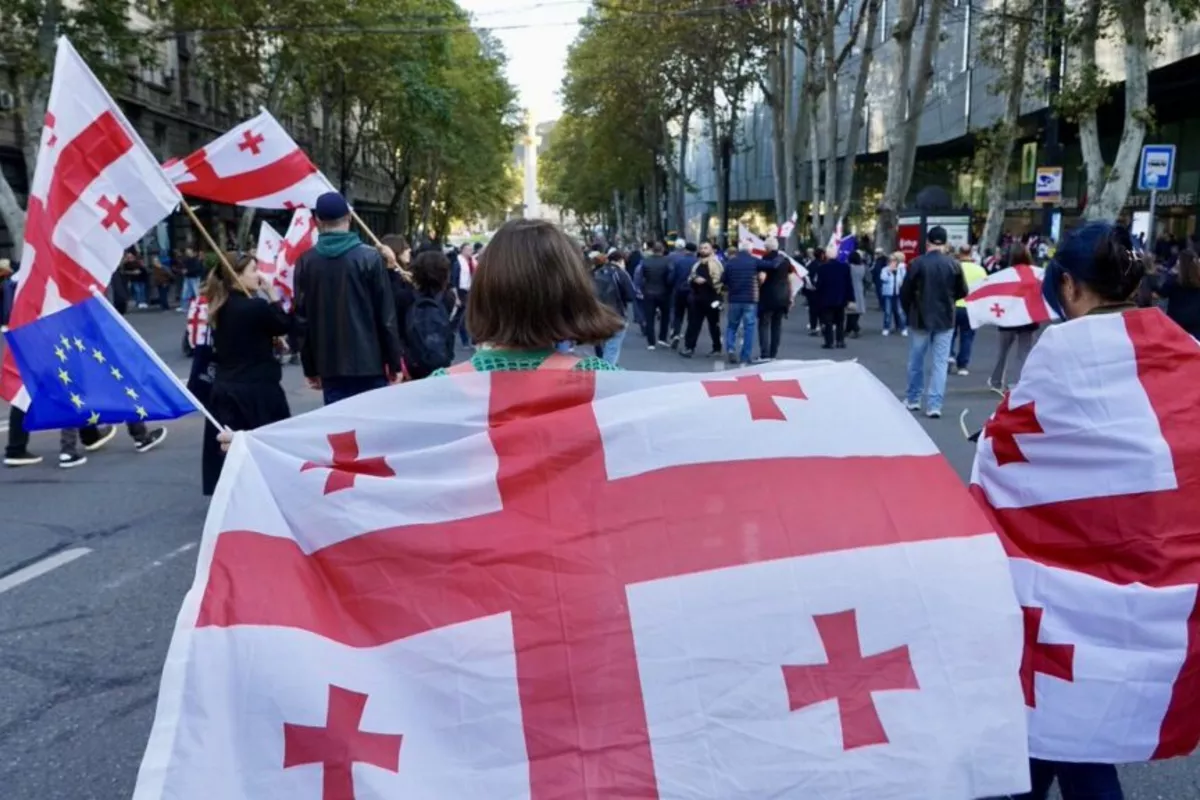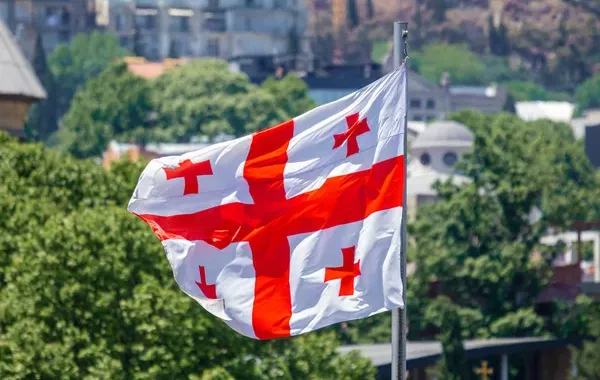
Photo credit: jam-news.net
Georgian Dream, in power for 14 years, won the 4 October elections amid the lowest voter turnout in the country’s post-independence history. The vote took place against the backdrop of ongoing protests and a partial opposition boycott. Election day ended with a large anti-government rally and an attempt to storm the presidential residence, The Caspian Post reports citing foreign media.
The government described the 4 October events as an “attempted coup” and accused the European Union of orchestrating and inciting it.
This was followed by the arrests of opposition leaders and activists. So far, 46 people have been detained in connection with the 4 October unrest, and Kobakhidze has said the number will continue to grow.
Criminal cases, arrests and “hand of Brussels”
The Georgian authorities have described the 4 October events as an attempted coup.
That same day, the organisers of the rally and those accused of initiating the storming of the presidential residence - Paata Burchuladze, Irakli Nadiradze, Lasha Beridze, Murtaz Zodelava and Paata Manjgaladze - were arrested. They have been charged with inciting the overthrow of the government and participating in group violence.
By 10 October, the total number of people detained in connection with the case had reached 46, including three women.
Police are investigating the case under four articles of the criminal code: incitement to overthrow the government, blocking or seizing key facilities, organising or participating in group violence, and property damage.
According to Georgia’s State Security Service (SSG), a cache containing explosives, automatic weapons, grenade launchers and other arms was discovered on 5 October in a forest near the capital. The weapons were allegedly intended for organising unrest. The SSG claims the cache was acquired by a man identified as B.Ch. on the orders of a Georgian citizen fighting on the Ukrainian side. Only the maker of a remote-control device has been detained so far, though officials say he had no direct link to the alleged plot. B.Ch. remains wanted.
Former defence minister under Mikheil Saakashvili’s government, Bacho Akhalaia, was also questioned by the Interior Ministry’s central criminal police department. His name has repeatedly surfaced in pro-government media in connection with the organisation of the 4 October protest.
Among those detained over the 4 October events was 71-year-old Giorgi Chakhnashvili, a well-known paediatrician and child cardiologist-rheumatologist. Chakhnashvili was arrested at his home in a noisy operation, with police surrounding the building.
Investigators have charged him with “attempting to seize a strategically important facility as part of a group” and “participating in group violence” during the 4 October rally. The Prosecutor’s Office released a video showing the doctor standing in the courtyard of the presidential residence, calling out to someone nearby, and then walking away. The footage shows no signs of violence on his part.
Amid widespread public outrage and support for the doctor, Chakhnashvili was released on bail set by the court at 20,000 lari (about 7,400 US dollars). The amount was raised by citizens.
Among the 46 detained protesters was also creative director Ia Darakhvelidze, who was likewise released on bail. Prosecutors published footage showing her and several others moving a rubbish bin and trying to block police officers’ advance.
According to Irakli Kobakhidze, the number of people arrested in connection with the 4 October case is set to rise:
“We now have more resources to identify those responsible than before. Therefore, all identified offenders will be held accountable… The state cannot allow violence of this scale against itself,” he said.
Kobakhidze also announced that opposition political parties would face prosecution. In an interview with the pro-government channel Rustavi-2 after 4 October, the Georgian Dream prime minister said that by 2028, parties such as Lelo, Gakharia for Georgia, and the United National Movement should no longer exist in Georgian politics.
Alongside the crackdown, the government has launched a new wave of anti-Western rhetoric. In recent days, Kobakhidze has actively criticised Western countries, openly accusing them of supporting a revolutionary agenda in Georgia.
At a 4 October briefing, Kobakhidze claimed that an EU official had supported a rally aimed at “overthrowing the constitutional order” and said that “special responsibility lies with the EU ambassador to Georgia.”
On 12 October, Georgian Dream parliamentary chairman Shalva Papuashvili said that “Brussels is behind the street clashes in Tbilisi.”
“I don’t know to what extent EU capitals realise that this ‘peaceful project’ [of the revolution] increasingly resembles a military project,” Papuashvili added.
Opposition criticism of 4 October
Questions about 4 October are not limited to the government; opposition figures and the protest movement have raised their own concerns. One of the main questions is: “What did the rally organisers hope to achieve by promising the people the government’s overthrow on 4 October?” Critics have also highlighted the lack of a clear plan and the spontaneous decision to storm the presidential residence.
Opposition members are also suspicious that it took protesters only six seconds to break through the presidential palace’s fence, suggesting it may have been weakened beforehand to allow it to fall easily.
Another point of concern is that, despite the scale of the protest and the declared “peaceful revolution,” the strategically important site was guarded by only three uniformed law enforcement officers and three plainclothes officers.
Experts note deep disappointment and frustration within the protest community following 4 October. For many of the protesters who gathered after the elections, the events at the presidential residence were unacceptable. However, experts say this does not mean that the country’s protest momentum has disappeared.
Crackdowns, arrests, and the government’s accusations of “fascism” against the opposition have only fuelled further protests. Even after 4 October, demonstrations continue along Rustaveli Avenue.
Divided country
Political analyst David Darchiashvili believes the political crisis deepened after 4 October, leaving no space for dialogue between the authorities and the protesting segment of society.
“Their views are too different,” he told the publication Echo of the Caucasus.
Expert Kaha Gogolashvili argues that the government is deliberately trying to distance Georgia from Europe while shifting the blame onto the European Union itself. According to him, the ruling party’s strategic goal is to gradually isolate the country from Brussels and justify this course by claiming that the West has “turned its back” on Georgia.
Darchiashvili sees the events of 4 October as a convenient and desirable scenario for the government, giving them a new pretext to legitimise crackdowns.
Experts note that the “zero sympathy” stance toward protesters primarily reflects the position of the country’s de facto ruler, Bidzina Ivanishvili:
“Kobakhidze is merely voicing Ivanishvili’s position. These are his words, his will. Kobakhidze just colours them with his own misanthropy,” the expert said.
According to Gogolashvili, the government uses every protest as an excuse to intensify repression and accuse the opposition of extremism and violence.
He argues that all Georgian Dream rhetoric is based on lies:“If they ever tell the truth, it is only to deceive you about something else.”
Gogolashvili believes the Kobakhidze-Ivanishvili strategy aims to legitimise authoritarian rule under the guise of “pragmatism.” The government, he says, has no intention of being recognised as a democratic state; it seeks only transactional relations-maintaining economic and infrastructure projects with the West without discussions about human rights.
In his view, Donald Trump was meant to be a convenient partner for Georgian Dream:
“Trump doesn’t care whether you’re a democrat or a dictator, as long as the deal is profitable. Ivanishvili wants to build such relations with the US so that questions about democracy don’t arise.”
The expert predicts further protest outbreaks in Georgia. Darchiashvili also notes: “4 October was an expression of despair, but at the same time of strength. People are tired, but they still take to the streets.”
Despite pressure on the opposition, media, and universities, Gogolashvili doubts the government will be able to suppress protests:
“People will not accept this. Repression will not bring peace to the regime.”
Share on social media
